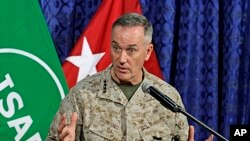PENTAGON —
The White House announced Tuesday that U.S. representatives will open direct talks with Taliban representatives in Doha, Qatar, within the next few days, aimed at finding a political solution to the Afghan war. The announcement is being welcomed by the commander of U.S. and coalition forces in Afghanistan, U.S. Marine General Joseph Dunford.
General Dunford said his forces had no role in facilitating the talks. Speaking by telephone from Kabul, he told reporters at the Pentagon it is not clear whether the talks will slow the violence. But he said he sees them as a good sign and hopes the Taliban will renounce violence in the course of the dialogue.
“We all realize that a successful conclusion to the campaign is eventually going to come through a political process and we're certainly watching with interest from over here in Kabul and encouraged that there seems to be some positive movement," said Dunford.
The commander does not hold out hope that the talks will curb violence by the Haqqani network, a Taliban faction, which has carried out a number of large attacks recently, saying it is hard to believe the group is reconcilable.
Dunford says he is concerned about the high number of casualties among Afghan forces as they take the lead in what is turning out to be an especially bloody fighting season. The Afghans have been losing more than 100 soldiers and police each week recently.
The Taliban, meantime, has been spreading messages that the U.S. is abandoning Afghan government forces. Dunford countered those messages Tuesday with reassurances that U.S. and coalition troops are still backing up Afghan soldiers and police.
“The nature of our relationship is changing, but the coalition is going to continue to support the Afghans through 2014," he said.
Dunford said the coalition is examining ways to reduce the number of casualties and continuing to assess the number of U.S. troops that would be left behind to train, advise, and assist Afghan forces after most international forces depart at the end of 2014. A decision on that number is expected later this year.
He said he believes Afghans will be able to take the lead in combat operations against insurgents as well as secure the elections that are scheduled next year.
General Dunford said his forces had no role in facilitating the talks. Speaking by telephone from Kabul, he told reporters at the Pentagon it is not clear whether the talks will slow the violence. But he said he sees them as a good sign and hopes the Taliban will renounce violence in the course of the dialogue.
“We all realize that a successful conclusion to the campaign is eventually going to come through a political process and we're certainly watching with interest from over here in Kabul and encouraged that there seems to be some positive movement," said Dunford.
The commander does not hold out hope that the talks will curb violence by the Haqqani network, a Taliban faction, which has carried out a number of large attacks recently, saying it is hard to believe the group is reconcilable.
Dunford says he is concerned about the high number of casualties among Afghan forces as they take the lead in what is turning out to be an especially bloody fighting season. The Afghans have been losing more than 100 soldiers and police each week recently.
The Taliban, meantime, has been spreading messages that the U.S. is abandoning Afghan government forces. Dunford countered those messages Tuesday with reassurances that U.S. and coalition troops are still backing up Afghan soldiers and police.
“The nature of our relationship is changing, but the coalition is going to continue to support the Afghans through 2014," he said.
Dunford said the coalition is examining ways to reduce the number of casualties and continuing to assess the number of U.S. troops that would be left behind to train, advise, and assist Afghan forces after most international forces depart at the end of 2014. A decision on that number is expected later this year.
He said he believes Afghans will be able to take the lead in combat operations against insurgents as well as secure the elections that are scheduled next year.




